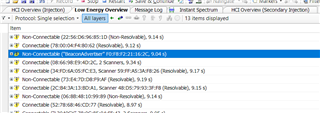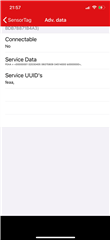Other Parts Discussed in Thread: SYSCONFIG, CC2640, , BOOSTXL-SHARP128
As the title says, Micro BLE/uBLE does not advertise after the uGAP is supposedly running. I have attached part of my code that starts everything, but it does not appear to work. Below is the bulk of my test code.
static void main_task(UArg a0, UArg a1)
{
volatile uint32 keyHwi;
bStatus_t status = FAILURE;
uint16_t advInterval = 160;
uint16_t advCount = 0;
int8 txStrength = 4;
int8 advType = UBLE_ADVTYPE_ADV_NC;
// uint8_t beaconLength = 30;
uint8_t bleAddress[B_ADDR_LEN];
static uint8_t beacon[] = {
0x02, 0x01, 0x06,
0x09, 0x09, 'S', 'u', 's', 's', 'u', 'r', 'o',
0x04, 0xFF, 0xC0, 0xFF, 0xEE
// 0x4C, 0x00, // Company identifier code (0x004C == Apple)
// 0x02, 0x15, // iBeacon advertisement indicator
// 0xe2, 0xc5, 0x6d, 0xb5, 0xdf, 0xfb, 0x48, 0xd2, 0xb0, 0x60, 0xd0, 0xf5, 0xa7, 0x10, 0x96, 0xe0, // ProximityUUID
// 0x00, 0x00, // Major
// 0x00, 0x00, // Minor
// 0xc5 // The 2's complement of the MeasuredPower
};
ugapBcastCBs_t pCBs = {
beacon_bcast_stateChangeCB,
beacon_bcast_advPrepareCB,
beacon_bcast_advDoneCB
};
// Create an RTOS event used to wake up this application to process events.
syncEvent = Event_create(NULL, NULL);
// Create an RTOS queue for message from profile to be sent to app.
mainAppMsgQueueHandle = Util_constructQueue(&mainAppMsgQueue);
// Default is not to switch antenna
uble_registerAntSwitchCB(NULL);
status = uble_stackInit(
UBLE_ADDRTYPE_PUBLIC, // Use the stored public address for testing
NULL, // No static address to set
myPostEvtProxyCB, // Callback to process the message in this context
RF_TIME_CRITICAL // Don't do it; when you want to go do it
);
if(status != SUCCESS) {
System_printf("uble_stackInit returned %d %s %d\n", status, __FUNCTION__, __LINE__);
return;
}
uble_setParameter(UBLE_PARAM_ADVINTERVAL, sizeof(uint16), &advInterval);
if(status != SUCCESS) {
System_printf("uble_setParameter returned %d %s %d\n", status, __FUNCTION__, __LINE__);
return;
}
uble_setParameter(UBLE_PARAM_TXPOWER, sizeof(int8), &txStrength);
if(status != SUCCESS) {
System_printf("uble_setParameter returned %d %s %d\n", status, __FUNCTION__, __LINE__);
return;
}
uble_setParameter(UBLE_PARAM_ADVTYPE, sizeof(int8), &advType);
if(status != SUCCESS) {
System_printf("uble_setParameter returned %d %s %d\n", status, __FUNCTION__, __LINE__);
return;
}
uble_setParameter(UBLE_PARAM_ADVDATA, sizeof(beacon), beacon);
if(status != SUCCESS) {
System_printf("uble_setParameter returned %d %s %d\n", status, __FUNCTION__, __LINE__);
return;
}
uble_getAddr(UBLE_ADDRTYPE_PUBLIC, bleAddress);
System_printf("BLE Address %02x:%02x:%02x:%02x:%02x:%02x\n",
bleAddress[0],
bleAddress[1],
bleAddress[2],
bleAddress[3],
bleAddress[4],
bleAddress[5]
);
status = ugap_bcastInit(&pCBs);
if(status != SUCCESS) {
System_printf("ugap_bcastInit returned %d %s %d\n", status, __FUNCTION__, __LINE__);
return;
}
ugap_bcastSetDuty(1, 0);
ugap_bcastStart(advCount);
if(status != SUCCESS) {
System_printf("ugap_bcastStart returned %d %s %d\n", status, __FUNCTION__, __LINE__);
return;
}
// This isn't really doing anything. The callback calls uble_processMsg() directly
for (;;)
{
// Waits for an event to be posted associated with the calling thread.
// Note that an event associated with a thread is posted when a
// message is queued to the message receive queue of the thread
Event_pend(syncEvent, Event_Id_NONE, UTIL_QUEUE_EVENT_ID, BIOS_WAIT_FOREVER);
// If RTOS queue is not empty, process app message.
while (!Queue_empty(mainAppMsgQueueHandle))
{
ubtEvt_t *pMsg;
// malloc() is not thread safe. Must disable HWI.
keyHwi = Hwi_disable();
pMsg = (ubtEvt_t *) Util_dequeueMsg(mainAppMsgQueueHandle);
Hwi_restore(keyHwi);
if (pMsg)
{
// Process message.
uble_processMsg();
// free() is not thread safe. Must disable HWI.
keyHwi = Hwi_disable();
// Free the space from the message.
free(pMsg);
Hwi_restore(keyHwi);
}
}
}
}
void myPostEvtProxyCB(void)
{
//TODO: Append a message to the MQ to deal with the data and resume immediately
// For now:
System_printf("uBLE Callback %s %d\n", __FUNCTION__, __LINE__);
uble_processMsg();
}
void beacon_bcast_stateChangeCB(ugapBcastState_t newState)
{
System_printf("State Callback %d %s %d\n", newState, __FUNCTION__, __LINE__);
return;
}
void beacon_bcast_advPrepareCB(void)
{
System_printf("Prepare Callback %s %d\n", __FUNCTION__, __LINE__);
return;
}
void beacon_bcast_advDoneCB(bStatus_t status)
{
System_printf("Ad Done Callback %d %s %d\n", status, __FUNCTION__, __LINE__);
return;
}
And this is the debug output:
BLE Address 54:fa:24:f2:f8:f0 uBLE Callback myPostEvtProxyCB 720 State Callback 1 beacon_bcast_stateChangeCB 726 uBLE Callback myPostEvtProxyCB 720 uBLE Callback myPostEvtProxyCB 720 State Callback 3 beacon_bcast_stateChangeCB 726
The last line is the last message I get out of the program. The state macro for 3 is UGAP_BCAST_STATE_ADVERTISING but I never see beacons come out. I tried copying parts of the Eddystone beacon example for the CC2640 but I got the same results. I can't find a good explanation for how uBLE actually works, just very sparse mentions and documentation for the API calls.
Questions:
- Is there something special which needs to be set up in sysconfig?
- Is there anything wrong with the data?




